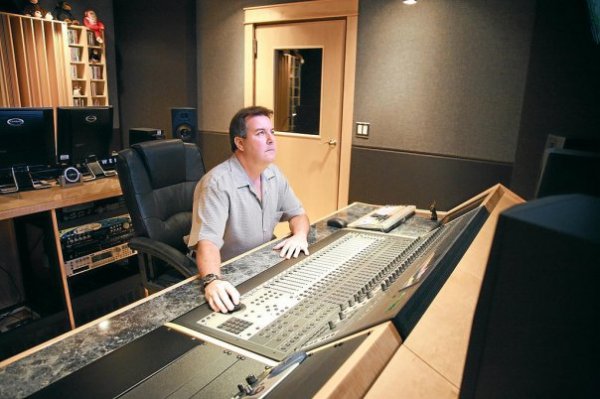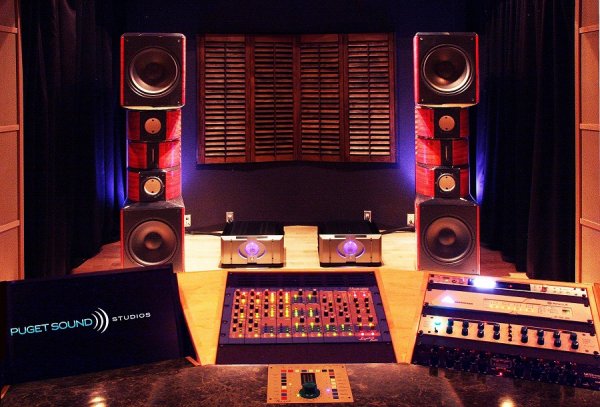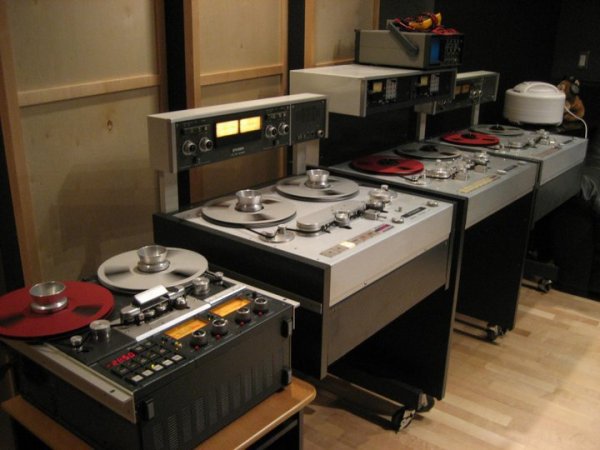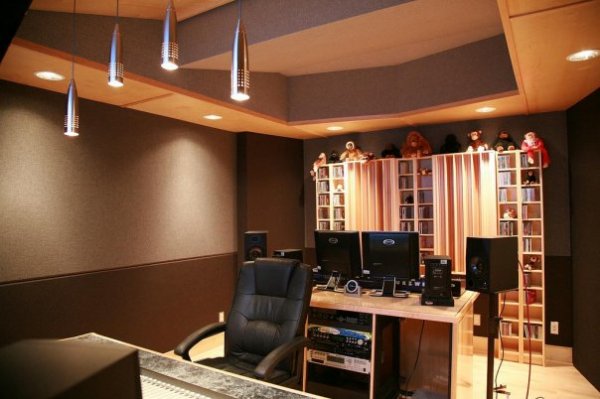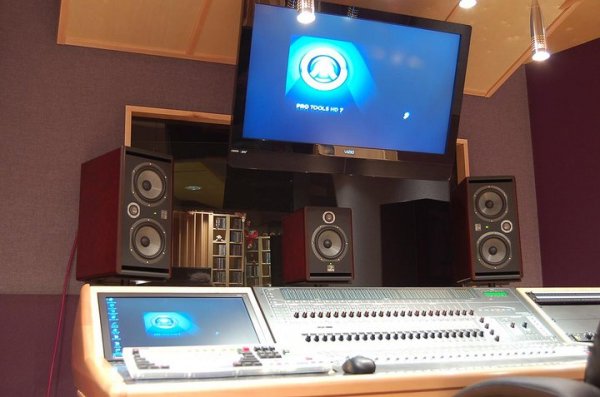Compression-before and after
- Thread starter aln
- Start date
You are using an out of date browser. It may not display this or other websites correctly.
You should upgrade or use an alternative browser.
You should upgrade or use an alternative browser.
The way we use compressors is for color/texture. We do not try to use them to make things louder unless asked.
There are 5 parts of a compressor.
1. Threshold - at what point do you want the compresser to start working
2. Attack - How quickly do you want the compresser to start working.
3. Release - At what point do you want the compresser to stop working.
4. Ratio - How much over the threshold do you want gain reduction. Ratio of 6:1 will allow 6dB over threshold of input signal to be reduced to 1dB over threshold or 5dB of gain reduction.
5. Gain - Since you have 5dB of gain reduction in the above scenario, you want to add that back by using "make-up gain".
Some of the other things a compressor can do are limiting, side-chain, multiband and others I can talk about later.
So much has been said about the loudness wars and compressors have gotten a bad rap. Compressors can be good. I use a compressor on almost every album. Theres nothing like running a signal through some iron to give it some color. This is how I like to use compresssion.
Now if a client wants me to make something louder, I do not use over a 2:1 ratio at anytime. If I need more loudness, I use 2 compressors at 2:1
I have found if I use a compressor at more than 2:1 over a whole track, it starts to sound bad and you will get that "pumping" or that up/down volume change that you hear in most clubs.
I'll write more later......
There are 5 parts of a compressor.
1. Threshold - at what point do you want the compresser to start working
2. Attack - How quickly do you want the compresser to start working.
3. Release - At what point do you want the compresser to stop working.
4. Ratio - How much over the threshold do you want gain reduction. Ratio of 6:1 will allow 6dB over threshold of input signal to be reduced to 1dB over threshold or 5dB of gain reduction.
5. Gain - Since you have 5dB of gain reduction in the above scenario, you want to add that back by using "make-up gain".
Some of the other things a compressor can do are limiting, side-chain, multiband and others I can talk about later.
So much has been said about the loudness wars and compressors have gotten a bad rap. Compressors can be good. I use a compressor on almost every album. Theres nothing like running a signal through some iron to give it some color. This is how I like to use compresssion.
Now if a client wants me to make something louder, I do not use over a 2:1 ratio at anytime. If I need more loudness, I use 2 compressors at 2:1
I have found if I use a compressor at more than 2:1 over a whole track, it starts to sound bad and you will get that "pumping" or that up/down volume change that you hear in most clubs.
I'll write more later......
De-Compression.
Came across a sound professional who took his CD of McCartney's "Memory Almost Full" and did what he called "reverse compression". He gave me a copy. The original was so compressed it hurt my head after about 30 seconds. Acc'd to one tool I have, it had a Dynamic range of about 6db.
The "decompressed" version sounded a bit flat, but was much better to my ears. I could actually sit and listen to the album. Acc'd to the same tool, the dynamic range of the altered file was about doubled.
I'm not an engineer. What do you think he did to his copy of the files to get that result?
Came across a sound professional who took his CD of McCartney's "Memory Almost Full" and did what he called "reverse compression". He gave me a copy. The original was so compressed it hurt my head after about 30 seconds. Acc'd to one tool I have, it had a Dynamic range of about 6db.
The "decompressed" version sounded a bit flat, but was much better to my ears. I could actually sit and listen to the album. Acc'd to the same tool, the dynamic range of the altered file was about doubled.
I'm not an engineer. What do you think he did to his copy of the files to get that result?
De-Compression.
Came across a sound professional who took his CD of McCartney's "Memory Almost Full" and did what he called "reverse compression". He gave me a copy. The original was so compressed it hurt my head after about 30 seconds. Acc'd to one tool I have, it had a Dynamic range of about 6db.
The "decompressed" version sounded a bit flat, but was much better to my ears. I could actually sit and listen to the album. Acc'd to the same tool, the dynamic range of the altered file was about doubled.
I'm not an engineer. What do you think he did to his copy of the files to get that result?
I would be interested in such a software.. Heck! I would care for the software equivalent of the Phase Linear Autocorrelation stuff. Some RnB, Rock and and Pop re-issues are atrocious and most of what comes out today from the hit factories are the same: No dynamics and loud ... is there such a software? I know that once compressed the original is lost but if I can make it more listenable that would be OK .. Free would be preferred
Last edited:
I would be interested in such a software.. Heck I would care for the software equivalent of the Phase Linear Autocorrelation stuff. Some RnB, Rock and and Pop re-issues are atrocious and most of what comes out today from the hit facotries are the same: No dynamics and loud ... is there such a software? I know that once compressed the orginal is lost but if I can make it more listenable that would be OK .. Free would be preferred
Free is good.
Tim
Once it's compressed, it can never be "de-compressed".
I assume what he did was lower the volume and use an upward expander. Years and years ago it was in vogue to use the "BBE Sonic Maximizer". Every song had the effect. The other was the Aphex Aural Exciter.
I assume what he did was lower the volume and use an upward expander. Years and years ago it was in vogue to use the "BBE Sonic Maximizer". Every song had the effect. The other was the Aphex Aural Exciter.
Last edited:
Compression has practical purposes which are pretty much limited to working around the limitations of obsolete recording mediums and broadcast audio.
It also has some aesthetic uses in pop music, such as smoothing out the levels on a lousy vocalist, taming percussive peaks on string bass that is miked too close and electric bass, fattening certain percussive sounds, etc.
In Classical or other acoustic music, I find it to be an undesirable distortion to the sound. Compressors are tools for shaping dynamics and in doing so, they depart from the reality of what was performed. That's why I refuse to use them in a digital era, unless a client is pig-headed enough to demand it and not listen to reason.
There's one other reason to use compression: when the playback medium is very poor. A Youtube video of fireworks with the full dynamic range doesn't impress when played on PC speakers. Add 65dB of compression to it and folks suddenly say it sounds great. Go figure...
It also has some aesthetic uses in pop music, such as smoothing out the levels on a lousy vocalist, taming percussive peaks on string bass that is miked too close and electric bass, fattening certain percussive sounds, etc.
In Classical or other acoustic music, I find it to be an undesirable distortion to the sound. Compressors are tools for shaping dynamics and in doing so, they depart from the reality of what was performed. That's why I refuse to use them in a digital era, unless a client is pig-headed enough to demand it and not listen to reason.
There's one other reason to use compression: when the playback medium is very poor. A Youtube video of fireworks with the full dynamic range doesn't impress when played on PC speakers. Add 65dB of compression to it and folks suddenly say it sounds great. Go figure...
Hi
Seems like the BBE site has some software which can do the trick ..How well? i haven't the slighest idea. They have downloadable demos
BBE SONIC MAXIMIZZERS SOFTWARE
"... I have never used these so I can't comment ... Learning curve could be stiff.
Seems like the BBE site has some software which can do the trick ..How well? i haven't the slighest idea. They have downloadable demos
BBE SONIC MAXIMIZZERS SOFTWARE
"... I have never used these so I can't comment ... Learning curve could be stiff.
Just came across this recording sample: 30 second drum solo, 15 seconds uncompressed followed by 15 seconds compressed. Try playing this good and loud and repeat several times. No headphones!
This is mild compression and meant to show the benefit of the compressor. Here's the source.
What I find is that the uncompressed recording makes it easy to feel the beat. The compressed version lets you hear more, but feel less. I definitely look forward to the day when there's some standard compression feature built into playback devices (like iPods) to allow people to add compression if they prefer, or not. Compression helps overcome background noise or dynamic limits of small speakers, but it's a bummer if you have a quiet room and high performance playback system (or even a not so quiet room and ability to play really loud).
Edit to add, I'm actually not sure how this would sound on headphones, haven't tested that. Maybe the effect is similar.
This is mild compression and meant to show the benefit of the compressor. Here's the source.
What I find is that the uncompressed recording makes it easy to feel the beat. The compressed version lets you hear more, but feel less. I definitely look forward to the day when there's some standard compression feature built into playback devices (like iPods) to allow people to add compression if they prefer, or not. Compression helps overcome background noise or dynamic limits of small speakers, but it's a bummer if you have a quiet room and high performance playback system (or even a not so quiet room and ability to play really loud).
Edit to add, I'm actually not sure how this would sound on headphones, haven't tested that. Maybe the effect is similar.
there is a quietness around each instrument...
Yes, and more depth when the stick lands on the drum. Funny some audio products like power conditioners claim to "blacken the background" or "create space around the instruments". I think dynamic compression causes audiophiles to want this type of improvement, and the solution is uncompressed recordings.
Similar threads
- Replies
- 2
- Views
- 1K
- Replies
- 39
- Views
- 4K
- Replies
- 0
- Views
- 364
| Steve Williams Site Founder | Site Owner | Administrator | Ron Resnick Site Co-Owner | Administrator | Julian (The Fixer) Website Build | Marketing Managersing |


